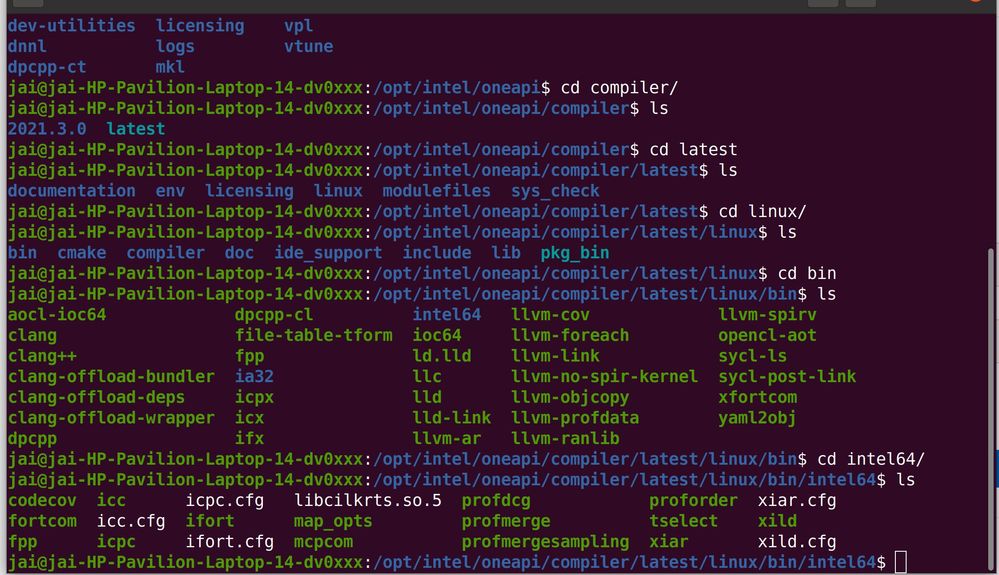- Mark as New
- Bookmark
- Subscribe
- Mute
- Subscribe to RSS Feed
- Permalink
- Report Inappropriate Content
I have installed one API HPC Toolkit in ubuntu now; how can I use ifort ?. What is a command for using the ifort? Would you please help me since I am struggling with this issue for a long?
Link Copied
- Mark as New
- Bookmark
- Subscribe
- Mute
- Subscribe to RSS Feed
- Permalink
- Report Inappropriate Content
- Mark as New
- Bookmark
- Subscribe
- Mute
- Subscribe to RSS Feed
- Permalink
- Report Inappropriate Content
Thanks for the reply, but still I am not getting which command I will use for ifort to compile a file.
- Mark as New
- Bookmark
- Subscribe
- Mute
- Subscribe to RSS Feed
- Permalink
- Report Inappropriate Content
Before trying anything, you have to open a shell window and source the start-up script, as described in the Get Started guide.
To compile and link a source file named xyz.f90, the command is
ifort xyz.f90You can run the resulting executable by typing
./a.out
- Mark as New
- Bookmark
- Subscribe
- Mute
- Subscribe to RSS Feed
- Permalink
- Report Inappropriate Content
Hi, Thanks for the reply,
Actually, I have installed the ifort in the location '' "/opt/intel/oneapi/compiler/latest/linux/bin/intel64 "" . So now what command I will use to compile the program. I have attached the screenshot. Please help me 
- Mark as New
- Bookmark
- Subscribe
- Mute
- Subscribe to RSS Feed
- Permalink
- Report Inappropriate Content
Please read the Get Started notes here. As mecej4 recommended.
(click on the link ^^^ up here ^^^^)
The programmer does NOT cd to the compiler installation directory. Instead, you (generally) cd to your workspace directory.
Prior to running the compiler, you must first setup the build environment. For the oneAPI build environment issue:
/opt/intel/oneapi/setvars.sh
There is a similar shell script to setup the environment for the "classic" version of the compiler.
After the (selected) environment is setup, the compiler (and tools) will be in PATH (and INCLUDE, etc...).
Jim Dempsey
- Mark as New
- Bookmark
- Subscribe
- Mute
- Subscribe to RSS Feed
- Permalink
- Report Inappropriate Content
Thanks, Sir, for giving such details, now I have done the steps but in the last line you wrote "" the compiler (and tools) will be in PATH (and INCLUDE, etc...)."" . this line I did not understand. and what is the command I will use to compile the program like " ifort xyz.f"
- Mark as New
- Bookmark
- Subscribe
- Mute
- Subscribe to RSS Feed
- Permalink
- Report Inappropriate Content
Did you install oneAPI HPC Toolkit in addition to oneAPI Base Toolkit?
ifx and ifort are in the HPC Toolkit.
See:
Jim Dempsey
- Mark as New
- Bookmark
- Subscribe
- Mute
- Subscribe to RSS Feed
- Permalink
- Report Inappropriate Content
Yes Sir I have already installed one API HPC Toolkit . Please have a look an the attached screenshot
Earlier I was using the command ~/intel/bin/ifort with the old version of ifort. So is there any command like this for this new version of intel- fortran?
- Mark as New
- Bookmark
- Subscribe
- Mute
- Subscribe to RSS Feed
- Permalink
- Report Inappropriate Content
The command is the same. You should not need to specify a path if you have properly "sourced" the build environment as described in the Getting Started document. Your screenshot suggests that you have not.
- Mark as New
- Bookmark
- Subscribe
- Mute
- Subscribe to RSS Feed
- Permalink
- Report Inappropriate Content
Sir, I was asking about the command so that I can compile my local file eg. xyz.f, now I found that command. which given below,
~/intel/oneapi/compiler/latest/linux/bin/intel64/ifort xyz.f
- Mark as New
- Bookmark
- Subscribe
- Mute
- Subscribe to RSS Feed
- Permalink
- Report Inappropriate Content
But the command "ifort xyz.f" should be enough because the full paths should be properly set bet the setvars script. If that has not been run there will be other problems that you might experience such as include files and defualt libraries etc
- Mark as New
- Bookmark
- Subscribe
- Mute
- Subscribe to RSS Feed
- Permalink
- Report Inappropriate Content
>>~/intel/oneapi/compiler/latest/linux/bin/intel64/ifort xyz.f
You still need to run the script when you enter the terminal window. While the above command line will locate ifort without running the script, it will result in ifort and the linker to not find other components necessary to build the application. e.g the INCLUDE and LIB paths will not have been specified (amongst potentially others).
Depending on what you have installed, you may need to run one or more setvar-equivilent script files. For my use, I place these few environment setups into a script file (e.g. gointel.sh), then run that upon opening a terminal window. Then, say if I want to run Eclipse I append "&" such that the build environment initialized command window persists:
eclipse&
Jim Dempsey
- Subscribe to RSS Feed
- Mark Topic as New
- Mark Topic as Read
- Float this Topic for Current User
- Bookmark
- Subscribe
- Printer Friendly Page

